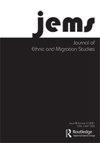可耻的回归:COVID-19 中的海湾移民和不断变化的国家叙事
IF 2.8
1区 社会学
Q1 DEMOGRAPHY
引用次数: 0
摘要
ABSTRACT 一些鼓励国际劳动力迁移的亚洲国家称其移民为 "民族英雄",因为他们为外汇储备和随后的国家发展做出了贡献。然而,在 COVID-19 大流行期间出现的大规模非自愿回流,以及从海湾国家等受病毒影响地区回流所带来的健康风险,使移民和移民汇款的发展叙事受到质疑。本研究探讨了海湾地区回国移民在孟加拉国的经历,重点关注他们抵达机场、回国途中、原籍社区的接待情况、回国后的经济困难以及原籍国不断变化的发展叙事。本文利用了 2020 年至 2021 年期间通过对孟加拉国海湾地区回国人员的访谈收集的一手数据。本研究发现,移民作为 "民族英雄 "的形象不仅在疫情期间受到挑战,而且几乎一夜之间就被新的形象所取代,如 "COVID-19 超级传播者"。本研究报告指出,移民在回移过程中会遇到一些不愉快的情况,使他们返回原籍国时蒙羞。本文强调应制定政策措施,保护非自愿回国者免受伤害和不光彩环境的影响。本文章由计算机程序翻译,如有差异,请以英文原文为准。
Disgraceful return: Gulf migration and shifting national narratives amid COVID-19
ABSTRACT Several Asian countries that encourage international migration of labour call their emigrants ‘national heroes and heroines’ because of their contributions to foreign currency reserves and subsequent national development. However, the massive involuntary return amid the COVID-19 pandemic and the health risk associated with returning from virus-affected regions, such as the Gulf states, call the development narratives of migrants and migrant remittances into question. This study examines the experiences of Gulf return migrants in Bangladesh, focusing on their arrivals at the airport, their travels home, their receptions at the origin communities, their financial hardship upon return and the shifting development narratives in the origin country. The paper draws on primary data, collected through interviews of Gulf returnees in Bangladesh between 2020 and 2021. This study finds that the image of migrants as ‘national heroes’ is not only challenged during the pandemic but replaced almost overnight by a new one, such as ‘COVID-19 super-spreaders’. This research reports that migrants confront with unpleasant circumstances during their return migration process that render their return to their country of origin disgraceful. The paper stresses developing policy measures to protect involuntary returnees from victimisation and disgraceful circumstances.
求助全文
通过发布文献求助,成功后即可免费获取论文全文。
去求助
来源期刊

Journal of Ethnic and Migration Studies
Multiple-
CiteScore
7.80
自引率
9.10%
发文量
157
期刊介绍:
The Journal of Ethnic and Migration Studies (JEMS) publishes the results of first-class research on all forms of migration and its consequences, together with articles on ethnic conflict, discrimination, racism, nationalism, citizenship and policies of integration. Contributions to the journal, which are all fully refereed, are especially welcome when they are the result of original empirical research that makes a clear contribution to the field of migration JEMS has a long-standing interest in informed policy debate and contributions are welcomed which seek to develop the implications of research for policy innovation, or which evaluate the results of previous initiatives. The journal is also interested in publishing the results of theoretical work.
 求助内容:
求助内容: 应助结果提醒方式:
应助结果提醒方式:


